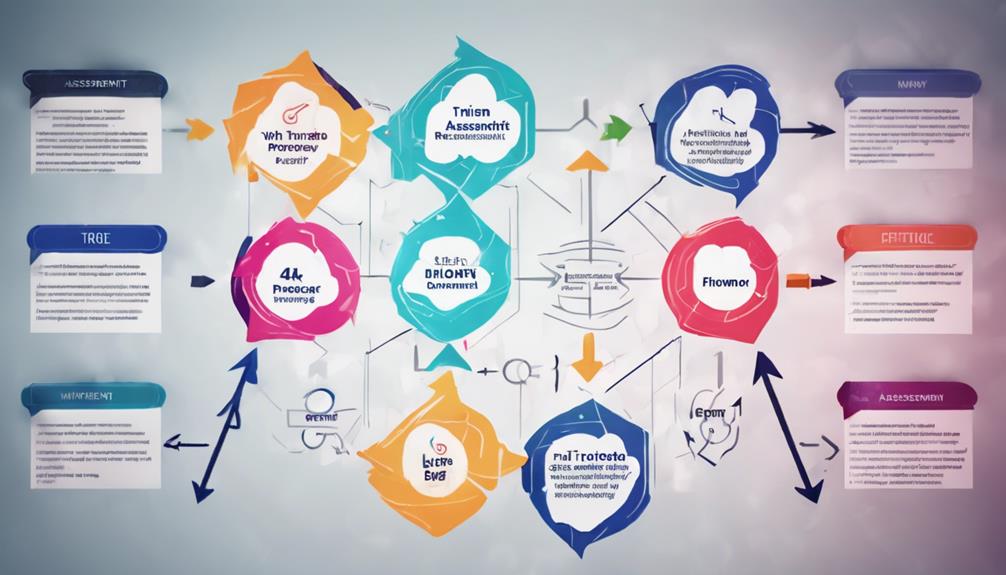Trasformare la gestione con efficienza di triage migliora notevolmente il processo decisionale e l'allocazione delle risorse. Originario delle pratiche militari, il sistema di triage categorizza i compiti in base alla loro criticità, garantendo che le esigenze urgenti siano prioritarie. L'implementazione di questo sistema snellisce le operazioni, riduce lo stress dei dipendenti e migliora la soddisfazione dei clienti. Creando flussi di lavoro strutturati, le organizzazioni possono adattarsi rapidamente alle sfide, identificando e affrontando i colli di bottiglia. Inoltre, valutazioni regolari affinano il processo di triage, rafforzando la resilienza e l'efficacia complessive. Con meccanismi così robusti in atto, le aziende possono navigare ambienti complessi con maggiore abilità. I benefici di questo approccio trasformativo vanno oltre le operazioni, offrendo spunti sulle sue applicazioni nel mondo reale per il miglioramento della gestione.
Punti chiave
- L'implementazione di un sistema di triage dà priorità ai compiti in base all'impatto, consentendo ai manager di concentrarsi su ciò che conta di più per il successo dell'organizzazione.
- Valutare e affinare regolarmente i processi di triage migliora la reattività, permettendo alla direzione di adattarsi in modo efficiente alle esigenze in cambiamento.
- Delegare compiti a bassa priorità riduce il carico di lavoro dei manager, promuovendo un uso più efficace del tempo e delle risorse per questioni critiche.
- La mappatura visiva dei flussi di lavoro di triage chiarisce i processi, migliora la comunicazione e aiuta a identificare i colli di bottiglia per operazioni più snodate.
Fondamenti del Sistema di Triage

Il sistema di triage, radicato nella storia militare, funge da framework strategico per prioritizzare i compiti in base alla loro criticità e impatto organizzativo.
Originato durante le guerre napoleoniche, è stato sviluppato da Dominique Jean Larrey per allocare efficientemente risorse limitate in situazioni ad alta pressione.
Questo approccio sistematico categorizza i compiti in tre livelli distinti: critici, meno critici e minori.
Concentrandosi sulle esigenze più urgenti, le organizzazioni possono ridurre i carichi di lavoro e migliorare l'efficienza operativa.
Il sistema di triage abilita i decisori a navigare periodi di incertezza, assicurando che i compiti essenziali siano affrontati prontamente.
Alla fine, questa metodologia promuove una cultura di risposta e adattabilità, posizionando le organizzazioni per prosperare in mezzo a domande e sfide fluttuanti.
Passi per implementare il triage

Implementare un sistema di triage implica un approccio strutturato per prioritizzare i compiti in modo efficace, garantendo che le organizzazioni possano rispondere alle richieste con agilità e precisione.
Il primo passo è creare un elenco dettagliato di compiti e iniziative strategiche, seguito dall'assegnazione delle priorità in base al loro impatto organizzativo e alla loro criticità. Valutare se i compiti possono aderire a procedure standard o richiedere soluzioni uniche.
Per minimizzare i ritardi, è fondamentale evitare di rinviare i compiti a bassa priorità. Delegare le attività di routine consente alla direzione di concentrarsi su problemi ad alta priorità.
Inoltre, mappare le azioni per ciascun compito garantisce chiarezza nella proprietà e responsabilità, facilitando un flusso di lavoro coeso. Una valutazione regolare e un affinamento del sistema di triage migliorano ulteriormente la sua efficacia nella gestione delle richieste variabili.
Vantaggi dell'Efficienza della Triage

L'efficienza migliorata del triage semplifica notevolmente i processi decisionali, consentendo alle organizzazioni di rispondere adeguatamente alle esigenze urgenti mantenendo al contempo la stabilità operativa. Questo approccio non solo allevia la pressione sulla direzione, ma favorisce anche un ambiente proattivo che migliora il morale dei dipendenti e la soddisfazione dei clienti. Prioritizzando efficacemente i compiti, le organizzazioni possono allocare le risorse con saggezza, assicurando che le esigenze critiche siano soddisfatte prontamente.
| Vantaggio | Impatto | Risonanza Emotiva |
|---|---|---|
| Miglioramento del Processo Decisionale | Tempi di risposta più rapidi | Fiducia nella leadership |
| Riduzione dello Stress dei Dipendenti | Tassi di burnout inferiori | Positività sul posto di lavoro |
| Maggiore Soddisfazione dei Clienti | Tassi di fidelizzazione più alti | Fiducia nell'organizzazione |
| Ottimizzazione dell'Allocazione delle Risorse | Operazioni efficienti | Senso di sicurezza |
| Maggiore Resilienza Organizzativa | Migliore gestione delle crisi | Sensazione di stabilità |
Mappatura dei processi di triage

Mappare i processi di triage è fondamentale per stabilire chiarezza nel flusso di lavoro e garantire che i compiti vengano eseguiti in modo efficiente in risposta a esigenze prioritarie. Questo comporta la delineazione di tutte le azioni necessarie per ciascun compito, dall'inizio alla risoluzione, migliorando così responsabilità e appartenenza tra i membri del team.
Una rappresentazione visiva di questi flussi di lavoro consente una migliore comprensione e comunicazione all'interno dell'organizzazione. Identificando i passaggi necessari, le organizzazioni possono snellire le operazioni, riducendo i colli di bottiglia e garantendo risposte tempestive a questioni critiche.
Inoltre, una mappatura efficace dei processi consente adattabilità a richieste variabili, assicurando che le risorse siano allocate dove sono più necessarie. In definitiva, un processo di triage ben mappato favorisce un ambiente di efficienza e reattività, essenziale per affrontare sfide operative complesse.
Informazioni Strategiche per il Triage

Sfruttare insights strategici per il triage può elevare notevolmente la capacità di un'organizzazione di rispondere efficacemente a richieste e crisi in continuo cambiamento.
Comprendendo le variazioni nella domanda, le organizzazioni possono adattare i loro processi di triage per garantire la massima efficienza. Ciò implica dare priorità ai compiti critici che impattano direttamente sulla continuità operativa e sull'allocazione delle risorse.
Implementare un approccio sistematico, come la mappatura dei processi end-to-end, favorisce chiarezza nella responsabilità dei compiti e nell'accountability.
Inoltre, le organizzazioni devono concentrarsi sul risolvere tempestivamente le questioni urgenti, il che migliora la soddisfazione del cliente e riduce lo stress dei dipendenti.
La valutazione continua e il perfezionamento del sistema di triage sono essenziali per migliorare la resilienza e l'adattabilità.
In ultima analisi, queste intuizioni strategiche consentono alle organizzazioni di navigare nelle complessità mantenendo un solido framework operativo.
Domande Frequenti
Come influisce il triage sulla dinamica e collaborazione del team?
La triage favorisce dinamiche di squadra migliorate promuovendo priorità chiare, riducendo l'ambiguità e facilitando la collaborazione. Consente ai membri del team di concentrarsi su compiti critici, migliorando in ultima analisi la comunicazione e la coesione, mentre si riduce lo stress durante i periodi di alta domanda.
Quali strumenti possono aiutare a implementare efficacemente un sistema di triage?
L'implementazione efficace del triage può aumentare la produttività del team fino al 25%. Strumenti come le bacheche Kanban, il software di gestione delle attività e le matrici di priorità facilitano la prioritizzazione, migliorano la visibilità e semplificano la comunicazione, supportando in ultima analisi un'esecuzione efficiente dei compiti in ambienti dinamici.
La triage può essere applicata in situazioni aziendali non di emergenza?
Sì, il triage può essere efficacemente applicato in situazioni aziendali non di emergenza, prioritizzando i compiti in base all'urgenza e all'importanza, consentendo alle organizzazioni di allocare le risorse in modo efficiente, semplificare i flussi di lavoro e migliorare il processo decisionale di fronte a diverse esigenze e sfide operative.
Come Misuri il Successo di un Sistema di Triage?
Misurare il successo di un sistema di triage implica valutare indicatori chiave di prestazione come i tassi di completamento dei compiti, la soddisfazione dei dipendenti, il feedback dei clienti e i tempi di risposta, insieme alla valutazione dell'efficienza operativa complessiva e dell'efficacia dell'allocazione delle risorse.
Quali errori comuni dovrebbero essere evitati quando si utilizza il triage?
Quando si implementa un sistema di triage, è importante evitare errori comuni come trascurare i compiti a bassa priorità, formare insufficientemente il personale e non adattare i processi. Questi errori possono compromettere l'efficienza e, in ultima analisi, ostacolare il successo e la reattività dell'organizzazione.
Conclusione
In un mondo dove il caos regna sovrano e le scadenze si stagliano come nuvoloni minacciosi, l'implementazione di un sistema di triage emerge come il faro definitivo di salvezza organizzativa.
Prioritizzando i compiti con precisione chirurgica, le aziende possono trascendere la mediocrità, trasformando lo stress in trionfo e la soddisfazione del cliente in un diluvio travolgente di fedeltà.
Abbracciare l'efficienza del triage non solo semplifica le operazioni, ma eleva le organizzazioni a altezze senza pari di successo. La capacità di assegnare priorità in modo rapido ed efficace consente alle organizzazioni di ottimizzare le risorse e di gestire al meglio le situazioni di emergenza. Tuttavia, per ottenere un impatto ancora maggiore, è necessaria una trasformazione audace di cafu che coinvolga l’intera struttura organizzativa e promuova una cultura basata sull’efficienza e sull’innovazione. Solo attraverso un impegno totale e una leadership forte si potranno raggiungere livelli di successo mai visti prima.
Questo assicura che ogni sfida diventi un'opportunità per un risultato straordinario nella perenne ricerca dell'eccellenza.









